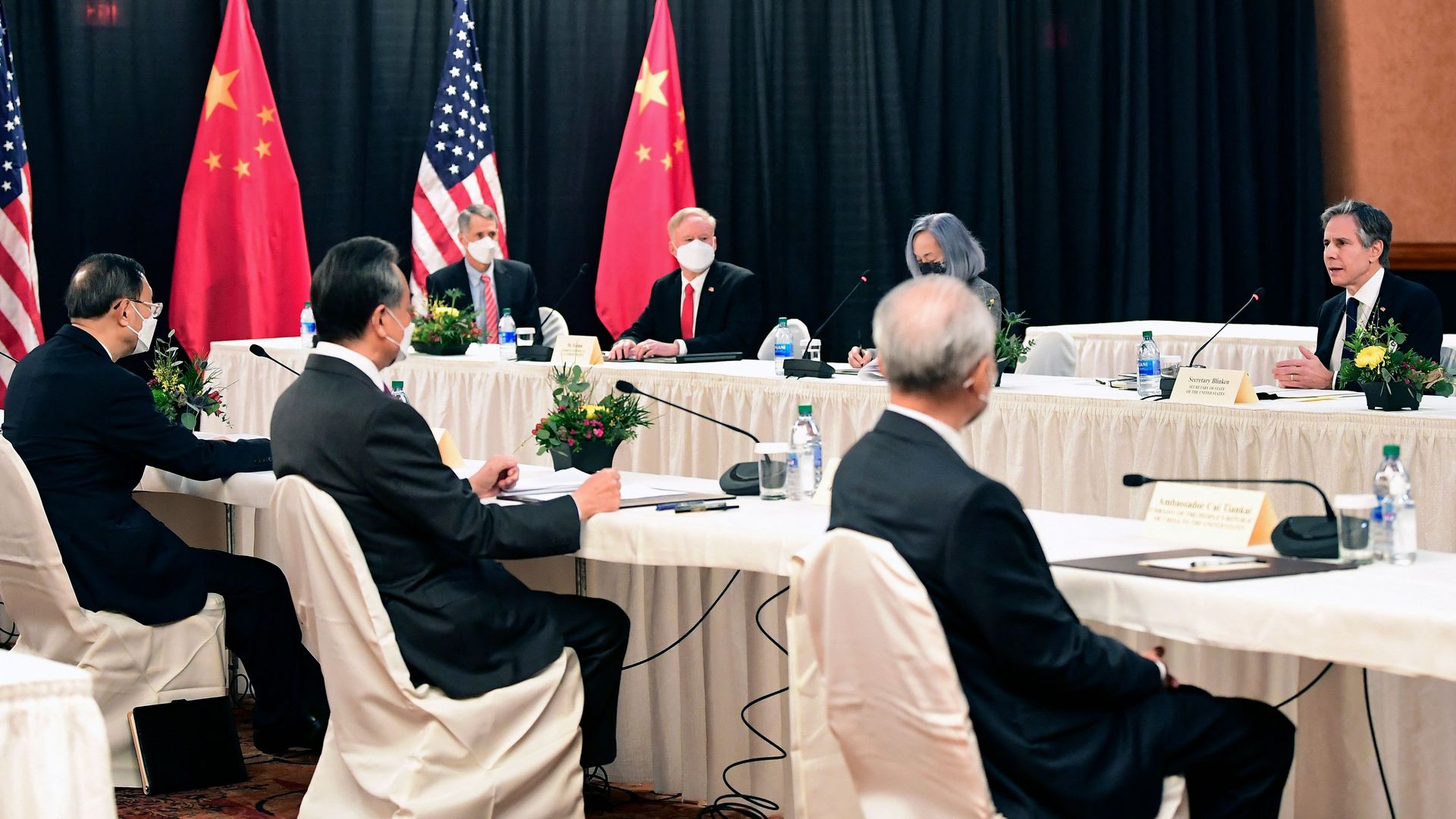Beijing hopes for tactical reset with Biden, but prepares for long struggle
Add Axios as your preferred source to
see more of our stories on Google.

The U.S.-China meeting in Anchorage. Frederic J. Brown/POOL/AFP via Getty
Secretary of State Antony Blinken and National Security Adviser Jake Sullivan are in Anchorage in the middle of their first meeting with their Chinese counterparts.
The big picture: After the tumult of the Trump administration, Chinese diplomats have gone into the meeting openly calling for the re-establishment of “strategic dialogue” and a more cooperative relationship. But the chances of that look slim.
- From trade and technology, to the South China Sea and Taiwan, to Hong Kong and Xinjiang, the political terrain of the U.S.-China relationship remains overwhelmingly adversarial.
- In both Washington and Beijing, a new culture of strategic competition now runs deep across the board.
The state of play: While Chinese diplomats are still playing up the idea of a relationship based on “no conflict, no confrontation, mutual respect and win-win cooperation” in public, Chinese President Xi Jinping and his closest military and security staff are sounding a very different note:
- Given China’s strong economic performance, the phrase “rise of the East and decline of the West” is now echoing around Beijing.
- Xi has assured China’s top leadership that “the world is in a turbulent time that is unprecedented in the past century… but time and momentum are on our side.”
- Chinese Defense Minister Wei Fenghe recently declared that China’s strategic confrontation with the U.S. has entered a period of essentially equal balance and that “containment and counter-containment will be the main theme of bilateral ties in the long term.”
Meanwhile, in Asia, China has only stepped up its hardline approach, accelerating military sorties across the Taiwan Strait and into waters near Japan, dismantling Hong Kong’s democratic autonomy, brushing aside criticism of human rights abuses in Xinjiang, and pledging to step up “the extra-territorial application of Chinese law” to punish critics abroad.
Between the lines: The overall sentiment in Beijing two months into the Biden administration is one of strategic continuity accompanied by a degree of tactical diplomatic flexibility.
- China’s strategy remains one of building its comprehensive economic, military, and technological power over the course of the decade ahead in order to achieve its territorial objectives without having to ever fire a shot.
- Tactically, Xi’s goal for his diplomats is to buy as much time as possible in the short term by enmeshing the relationship in a complex of dialogue mechanisms while the relative balance power continues to move more decisively in Beijing’s favor.
The Biden administration isn’t buying it, having gone out of their way to specify that “this is not a strategic dialogue,” and their priority is to “engage China from a position of strength.”
- Beijing’s initial hopes that the Biden administration might wind down the focus on “strategic competition” with China have largely been dashed. Both sides are settling in for a long struggle.
What to watch: While it won’t make for great headlines, the best outcome from Anchorage is to agree on a channel for high level future political contact between the two sides, although this will be much narrower in scope than the Strategic and Economic Dialogue of the Bush and Obama years.
- There is also likely to be some level of agreement to advance practical cooperation in specific areas like climate change, which is too important for both countries to allow it to become a casualty of the competitive and adversarial nature of the rest of the relationship.
Kevin Rudd was the 26th Prime Minister of Australia and is President of the Asia Society Policy Institute and Chair of the International Peace Institute in New York.
This article was adapted from a speech on Thursday evening at the Asia Society Policy Institute. Read the full text or watch the discussion with experienced China watchers Bill Bishop and Susan Jakes.
